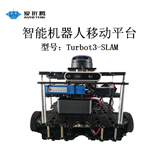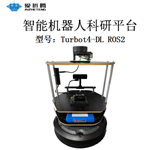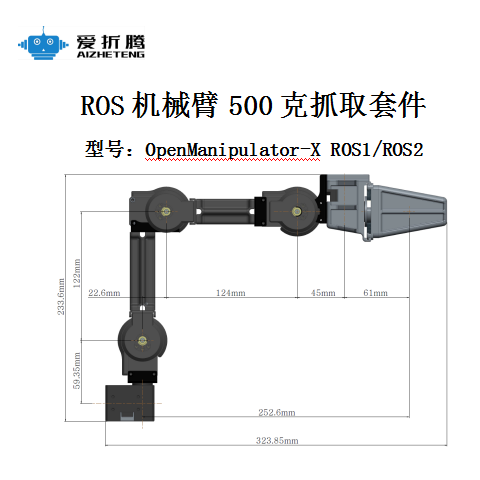ROS2与tf2入门教程-编写tf2侦听器 (C++)
说明:
- 介绍如何在C++编写 tf2 侦听器
步骤:
- 下载示例侦听器代码
cd ~/tf2_ws/src/learning_tf2_cpp/src
wget https://raw.githubusercontent.com/ros/geometry_tutorials/ros2/turtle_tf2_cpp/src/turtle_tf2_listener.cpp
- 打开文件
#include <geometry_msgs/msg/transform_stamped.hpp>
#include <geometry_msgs/msg/twist.hpp>
#include <rclcpp/rclcpp.hpp>
#include <tf2/exceptions.h>
#include <tf2_ros/transform_listener.h>
#include <tf2_ros/buffer.h>
#include <turtlesim/srv/spawn.hpp>
#include <chrono>
#include <memory>
#include <string>
using std::placeholders::_1;
using namespace std::chrono_literals;
class FrameListener : public rclcpp::Node
{
public:
FrameListener()
: Node("turtle_tf2_frame_listener"),
turtle_spawning_service_ready_(false),
turtle_spawned_(false)
{
// Declare and acquire `target_frame` parameter
this->declare_parameter<std::string>("target_frame", "turtle1");
this->get_parameter("target_frame", target_frame_);
tf_buffer_ =
std::make_unique<tf2_ros::Buffer>(this->get_clock());
transform_listener_ =
std::make_shared<tf2_ros::TransformListener>(*tf_buffer_);
// Create a client to spawn a turtle
spawner_ =
this->create_client<turtlesim::srv::Spawn>("spawn");
// Create turtle2 velocity publisher
publisher_ =
this->create_publisher<geometry_msgs::msg::Twist>("turtle2/cmd_vel", 1);
// Call on_timer function every second
timer_ = this->create_wall_timer(
1s, std::bind(&FrameListener::on_timer, this));
}
private:
void on_timer()
{
// Store frame names in variables that will be used to
// compute transformations
std::string fromFrameRel = target_frame_.c_str();
std::string toFrameRel = "turtle2";
if (turtle_spawning_service_ready_) {
if (turtle_spawned_) {
geometry_msgs::msg::TransformStamped transformStamped;
// Look up for the transformation between target_frame and turtle2 frames
// and send velocity commands for turtle2 to reach target_frame
try {
transformStamped = tf_buffer_->lookupTransform(
toFrameRel, fromFrameRel,
tf2::TimePointZero);
} catch (tf2::TransformException & ex) {
RCLCPP_INFO(
this->get_logger(), "Could not transform %s to %s: %s",
toFrameRel.c_str(), fromFrameRel.c_str(), ex.what());
return;
}
geometry_msgs::msg::Twist msg;
static const double scaleRotationRate = 1.0;
msg.angular.z = scaleRotationRate * atan2(
transformStamped.transform.translation.y,
transformStamped.transform.translation.x);
static const double scaleForwardSpeed = 0.5;
msg.linear.x = scaleForwardSpeed * sqrt(
pow(transformStamped.transform.translation.x, 2) +
pow(transformStamped.transform.translation.y, 2));
publisher_->publish(msg);
} else {
RCLCPP_INFO(this->get_logger(), "Successfully spawned");
turtle_spawned_ = true;
}
} else {
// Check if the service is ready
if (spawner_->service_is_ready()) {
// Initialize request with turtle name and coordinates
// Note that x, y and theta are defined as floats in turtlesim/srv/Spawn
auto request = std::make_shared<turtlesim::srv::Spawn::Request>();
request->x = 4.0;
request->y = 2.0;
request->theta = 0.0;
request->name = "turtle2";
// Call request
using ServiceResponseFuture =
rclcpp::Client<turtlesim::srv::Spawn>::SharedFuture;
auto response_received_callback = [this](ServiceResponseFuture future) {
auto result = future.get();
if (strcmp(result->name.c_str(), "turtle2") == 0) {
turtle_spawning_service_ready_ = true;
} else {
RCLCPP_ERROR(this->get_logger(), "Service callback result mismatch");
}
};
auto result = spawner_->async_send_request(request, response_received_callback);
} else {
RCLCPP_INFO(this->get_logger(), "Service is not ready");
}
}
}
// Boolean values to store the information
// if the service for spawning turtle is available
bool turtle_spawning_service_ready_;
// if the turtle was successfully spawned
bool turtle_spawned_;
rclcpp::Client<turtlesim::srv::Spawn>::SharedPtr spawner_{nullptr};
rclcpp::TimerBase::SharedPtr timer_{nullptr};
rclcpp::Publisher<geometry_msgs::msg::Twist>::SharedPtr publisher_{nullptr};
std::shared_ptr<tf2_ros::TransformListener> transform_listener_{nullptr};
std::unique_ptr<tf2_ros::Buffer> tf_buffer_;
std::string target_frame_;
};
int main(int argc, char * argv[])
{
rclcpp::init(argc, argv);
rclcpp::spin(std::make_shared<FrameListener>());
rclcpp::shutdown();
return 0;
}
- 修改CMakeLists.txt文件,再原来的内容基础上添加turtle_tf2_listener的内容:
add_executable(turtle_tf2_listener src/turtle_tf2_listener.cpp)
ament_target_dependencies(
turtle_tf2_listener
geometry_msgs
rclcpp
tf2
tf2_ros
turtlesim
)
install(TARGETS
turtle_tf2_listener
DESTINATION lib/${PROJECT_NAME})
- 修改turtle_tf2_demo.launch.py文件
- 修改后内容如下:
from launch import LaunchDescription
from launch.actions import DeclareLaunchArgument
from launch.substitutions import LaunchConfiguration
from launch_ros.actions import Node
def generate_launch_description():
return LaunchDescription([
Node(
package='turtlesim',
executable='turtlesim_node',
name='sim'
),
Node(
package='learning_tf2_cpp',
executable='turtle_tf2_broadcaster',
name='broadcaster1',
parameters=[
{'turtlename': 'turtle1'}
]
),
DeclareLaunchArgument(
'target_frame', default_value='turtle1',
description='Target frame name.'
),
Node(
package='learning_tf2_cpp',
executable='turtle_tf2_broadcaster',
name='broadcaster2',
parameters=[
{'turtlename': 'turtle2'}
]
),
Node(
package='learning_tf2_cpp',
executable='turtle_tf2_listener',
name='listener',
parameters=[
{'target_frame': LaunchConfiguration('target_frame')}
]
),
])
- 构建
colcon build --symlink-install --packages-select learning_tf2_cpp
- 加载工作空间
. ~/tf2_ws/install/local_setup.bash
测试:
- 运行代码
. ~/tf2_ws/install/local_setup.bash
ros2 launch learning_tf2_cpp turtle_tf2_demo.launch.py
应该看到带有两只海龟的海龟模拟
键盘控制
ros2 run turtlesim turtle_teleop_key
- 效果和python的实现类似,控制第一个海龟移动,第二个海龟会跟随
参考:
- 资料来源
获取最新文章: 扫一扫右上角的二维码加入“创客智造”公众号



















